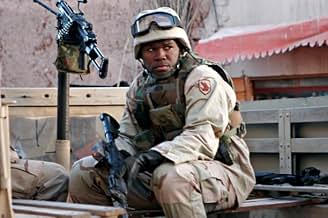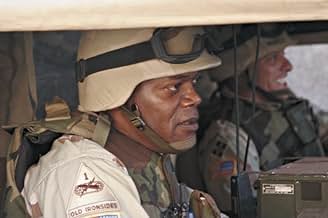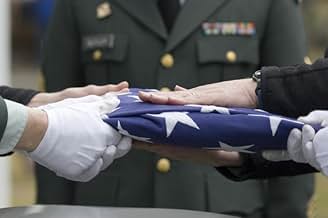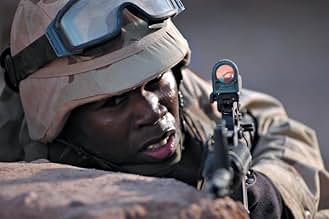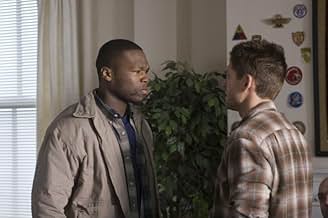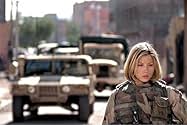IMDb रेटिंग
5.6/10
11 हज़ार
आपकी रेटिंग
अपनी भाषा में प्लॉट जोड़ेंThree soldiers struggle to readjust to life at home after returning home from a lengthy tour in Iraq.Three soldiers struggle to readjust to life at home after returning home from a lengthy tour in Iraq.Three soldiers struggle to readjust to life at home after returning home from a lengthy tour in Iraq.
- पुरस्कार
- 4 कुल नामांकन
50 Cent
- Jamal Aiken
- (as Curtis Jackson)
Jeffrey Nordling
- Cary
- (as Jeff Nordling)
फ़ीचर्ड समीक्षाएं
A better title would be "Home of the Made-for-TV Movie"--You'd have to be from the "home of the brave film critics" to sit trough this laundry list of post-traumatic syndrome clichés. Three Iraq veterans return to face a civilian world that doesn't understand and personal demons that won't let them forget the ungodly carnage they lived through. But nothing is new or unique, no dialogue is incisive, no action is memorable.
The film does remind us about how unfair the whole Iraq invasion is to the soldier, who not only must suffer the damages to limb, life, and psyche but must also face a hostile electorate which carries little of the respect and patriotism that welcomed soldiers back from WWII. In this way, director Irwin Winkler achieved a success: He catalogued the suffering of the returning soldier, be he a surgeon experiencing the horror of failure to heal or a female grunt losing a hand and learning to live with the clumsiness.
A work of art should be unique in some way, often in its vision of its subject. Home of the Brave says nothing new to a populace awaiting insights into a war that still makes no sense. In that regard both fictional soldiers and real audiences remain largely clueless about the Iraq dilemma. Perhaps President Bush could helpI don't think so.
The film does remind us about how unfair the whole Iraq invasion is to the soldier, who not only must suffer the damages to limb, life, and psyche but must also face a hostile electorate which carries little of the respect and patriotism that welcomed soldiers back from WWII. In this way, director Irwin Winkler achieved a success: He catalogued the suffering of the returning soldier, be he a surgeon experiencing the horror of failure to heal or a female grunt losing a hand and learning to live with the clumsiness.
A work of art should be unique in some way, often in its vision of its subject. Home of the Brave says nothing new to a populace awaiting insights into a war that still makes no sense. In that regard both fictional soldiers and real audiences remain largely clueless about the Iraq dilemma. Perhaps President Bush could helpI don't think so.
Irwin Winkler's "Home of the Brave" is much more than "just a movie," even if, as such, it's a partially flawed one. It is, without question, an important, thought- and emotion-provoking film, certain to be controversial.
Regardless of its merits, "Home" is brave, worthwhile, even admirable in its pioneering coverage of 150,000 soldiers "over there," and roughly the same number of returnees, who are trying to return in fact, not only in name.
This story of a group of National Guard soldiers from Spokane serving in Iraq and returning home is a schizophrenic experience: you are watching scenes straight out of last night's TV news, and yet feel as if you were back in the 1940s, in the era of "The Best Years of Our Lives" war movies, and the 1970s "Born on the Fourth of July" type Vietnam veteran sagas.
Given the subject, it's to Winkler's credit that "Home of the Brave" (a confusing title choice, considering the many movies with that name) remains firmly neutral about the current debate central to all politics. The film portrays both the support for and the opposition to the war, but favors neither. Winkler (producer for 40 years, including "Rocky" II-VI) sticks with characters in the context of the war, not making mouthpieces of them for or against a cause.
Mouthpieces, no; cardboard figures, some. Writing (by Mark Friedman) and acting are fair-to-problematic. The overemotional writing and excessively melodramatic acting combine to present a drama of extremes, denying the existence of true majority response to trauma: simple coping. Murder, suicide, insanity do occur in postwar situations, but most people, in my own experience, deal with such problems - more or less successfully - and go on with their lives.
In "Home of the Brave," you find no such "middle of the road," only extremes. After suspenseful (and depressing) Iraqi war scenes, shot in Morocco by Tony Pierce-Roberts, in a remarkably focused way that allows rare visual clarity in the midst of combat confusion, the film shifts to Spokane.
There, we follow - among many others - the lives of a combat surgeon (Samuel L. Jackson), a driver who loses an arm (Jessica Biel), three high-school buddies with intertwining stories (Chad Michael Murray, Brian Presley, and rap star 50 Cent). There are some quiet moments and reality-based situations, but the constant high-voltage !DRAMA! reveals and partially invalidates a manipulative hand pulling the (heart) strings.
Regardless of its merits, "Home" is brave, worthwhile, even admirable in its pioneering coverage of 150,000 soldiers "over there," and roughly the same number of returnees, who are trying to return in fact, not only in name.
This story of a group of National Guard soldiers from Spokane serving in Iraq and returning home is a schizophrenic experience: you are watching scenes straight out of last night's TV news, and yet feel as if you were back in the 1940s, in the era of "The Best Years of Our Lives" war movies, and the 1970s "Born on the Fourth of July" type Vietnam veteran sagas.
Given the subject, it's to Winkler's credit that "Home of the Brave" (a confusing title choice, considering the many movies with that name) remains firmly neutral about the current debate central to all politics. The film portrays both the support for and the opposition to the war, but favors neither. Winkler (producer for 40 years, including "Rocky" II-VI) sticks with characters in the context of the war, not making mouthpieces of them for or against a cause.
Mouthpieces, no; cardboard figures, some. Writing (by Mark Friedman) and acting are fair-to-problematic. The overemotional writing and excessively melodramatic acting combine to present a drama of extremes, denying the existence of true majority response to trauma: simple coping. Murder, suicide, insanity do occur in postwar situations, but most people, in my own experience, deal with such problems - more or less successfully - and go on with their lives.
In "Home of the Brave," you find no such "middle of the road," only extremes. After suspenseful (and depressing) Iraqi war scenes, shot in Morocco by Tony Pierce-Roberts, in a remarkably focused way that allows rare visual clarity in the midst of combat confusion, the film shifts to Spokane.
There, we follow - among many others - the lives of a combat surgeon (Samuel L. Jackson), a driver who loses an arm (Jessica Biel), three high-school buddies with intertwining stories (Chad Michael Murray, Brian Presley, and rap star 50 Cent). There are some quiet moments and reality-based situations, but the constant high-voltage !DRAMA! reveals and partially invalidates a manipulative hand pulling the (heart) strings.
The main thing I didn't care for in this movie is that all the soldiers depicted that return home are all messed up emotionally and some of them mentally. I guess it would not have been interesting enough to at least have one normal person. I just don't think it's a fair representation.
The movie seemed more like a made for TV movie since a lot doesn't happen. It's OK for what it is, but just don't believe this is how all solderers turn out. Sam Jackson plays a doctor that returns home to his family and becomes a drunk and is just distant. Jessica Biel plays a mom whom returns with an amputated hand. She acts all dependent and doesn't want anyones help, but eventually accepts help. And Brian Pressley whom I've never heard of before plays Tommy, a guy who saw his best friend die and just feels like he needs to go back. And 50 cent plays Jamal, the really messed up mentally soldier whom you know is going to do something crazy.
As for Brian Presley, I've never seen him before this, but he sure was hot and I hope to see him starring in more movies. He definitely has the looks.
FINAL VERDICT: Not to great. It just depends if this sort of topic interests you as to whether it's worth seeing.
The movie seemed more like a made for TV movie since a lot doesn't happen. It's OK for what it is, but just don't believe this is how all solderers turn out. Sam Jackson plays a doctor that returns home to his family and becomes a drunk and is just distant. Jessica Biel plays a mom whom returns with an amputated hand. She acts all dependent and doesn't want anyones help, but eventually accepts help. And Brian Pressley whom I've never heard of before plays Tommy, a guy who saw his best friend die and just feels like he needs to go back. And 50 cent plays Jamal, the really messed up mentally soldier whom you know is going to do something crazy.
As for Brian Presley, I've never seen him before this, but he sure was hot and I hope to see him starring in more movies. He definitely has the looks.
FINAL VERDICT: Not to great. It just depends if this sort of topic interests you as to whether it's worth seeing.
Four soldiers return from the Middle East to discover that they can't make the adjustment to fat, peaceful civilian life as easily as they thought they would.
One of my favorite George Carlin routines -- in an intellectually-funny-and-true way -- is how we take strong, simple words, and substitute long, soft phrases that mean very little. The example he used was how the World War One phrase "shell shock", which is simple, graphic, and clear, became the longer and softer "combat fatigue" in the Second World War, and finally "Post-Traumatic Stress Disorder", which is so bloodless and vague it can be used to apply to what happens after any unhappy event. And so we lose the ability to identify and deal with shell shock. When the aftermath of days of constant war is described in the same way as a bruise on the arm, you can treat neither the readjustment to peace, nor a bruise.
That's what this movie is about. Four veterans are left to struggle on their own mid loving family who have no idea what's going on: Samuel J. Jackson, Jessica Biel, Brian Presley, and Curtis Jackson. They all give good performances.
One of my favorite George Carlin routines -- in an intellectually-funny-and-true way -- is how we take strong, simple words, and substitute long, soft phrases that mean very little. The example he used was how the World War One phrase "shell shock", which is simple, graphic, and clear, became the longer and softer "combat fatigue" in the Second World War, and finally "Post-Traumatic Stress Disorder", which is so bloodless and vague it can be used to apply to what happens after any unhappy event. And so we lose the ability to identify and deal with shell shock. When the aftermath of days of constant war is described in the same way as a bruise on the arm, you can treat neither the readjustment to peace, nor a bruise.
That's what this movie is about. Four veterans are left to struggle on their own mid loving family who have no idea what's going on: Samuel J. Jackson, Jessica Biel, Brian Presley, and Curtis Jackson. They all give good performances.
I can see why some people kinda hate this movie. It's a drama that could've been made for TV. It shows American soldiers returning back home and not their victims life and/or point of view. But the movie doesn't try to make a political statement about the war, it does however try (and achieve to a certain extent imho) to show us the tragic (after)life of a soldier. Yes Flags of our Fathers (C. Eastwood) is a better/superior picture in that respect, but that doesn't mean that Home of the Brave isn't at least good! While there is no full attack on/against the war (excuse the pun), certain moments do criticize the events. What really made this movie watchable for me, were the actors. The main actors did a good job conveying their trauma, fear and rage. While that might not be enough for many people, I did like what I saw. I liked the movie and the discussions here show that it affects people (even if it is in a bad way) and they keep talking about it. Although some conversations go to far, this only adds to the attraction/appealing of the movie ... whether you like it or not!
क्या आपको पता है
- ट्रिवियाSamuel L. Jackson and Christina Ricci appeared in Black Snake Moan (2006).
- गूफ़When one soldier is told to fire the AT-4 at a gunman on the roof, he is holding it backwards when he is firing it. The rocket comes out of the smaller end of the tube, not the larger.
- भाव
Will Marsh: Buck Fush? Buck you, you son of a bitch.
- साउंडट्रैकTry Not to Remember
Written and Performed by Sheryl Crow
Produced by Stephen Endelman
Warner-Tamerlane Publishing Corp. (BMI)/Old Crow Music (BMI)
(All rights adnimistered by Warner-Tamerlane Publishing Corp.)
Courtesy of A&M Records
टॉप पसंद
रेटिंग देने के लिए साइन-इन करें और वैयक्तिकृत सुझावों के लिए वॉचलिस्ट करें
- How long is Home of the Brave?Alexa द्वारा संचालित
विवरण
- रिलीज़ की तारीख़
- कंट्री ऑफ़ ओरिजिन
- आधिकारिक साइटें
- भाषाएं
- इस रूप में भी जाना जाता है
- Regreso al infierno
- फ़िल्माने की जगहें
- उत्पादन कंपनियां
- IMDbPro पर और कंपनी क्रेडिट देखें
बॉक्स ऑफ़िस
- बजट
- $1,20,00,000(अनुमानित)
- US और कनाडा में सकल
- $51,708
- US और कनाडा में पहले सप्ताह में कुल कमाई
- $6,000
- 17 दिस॰ 2006
- दुनिया भर में सकल
- $4,99,620
- चलने की अवधि1 घंटा 46 मिनट
- रंग
- ध्वनि मिश्रण
- पक्ष अनुपात
- 2.35 : 1
इस पेज में योगदान दें
किसी बदलाव का सुझाव दें या अनुपलब्ध कॉन्टेंट जोड़ें



